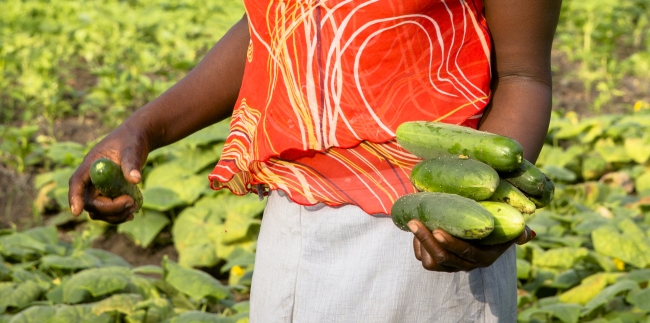Reducing risks in urban vegetable production
Crop irrigation with polluted water has caused a bit of a stink with policymakers and the public. Is the food safe to eat? Are there risks to the farmers themselves? If so, how can we reduce these risks?

Rapid urbanization in sub-Saharan Africa has brought about a boom in small-scale farming in and around cities. But the majority of these farms use water from rivers and streams polluted with sewage. In Ghana, an estimated 40,000 hectares is irrigated this way.
The issue and what to do about it are explored in detail in the new book Irrigated urban vegetable farming in Ghana: Characteristics, benefits and risk mitigation. It covers 10 years of research by the International Water Management Institute (IWMI) and its partners.
As well as providing a comprehensive overview of the situation, the book contains assessments of health risks associated with wastewater irrigation. It also outlines the options for minimizing these risks based on research conducted in Ghana by IWMI, in collaboration with the Food and Agriculture Organization of the United Nations (FAO) and the World Health Organization (WHO). It also features contributions from graduate students and lecturers from more than 10 universities.
This bigger, better second edition replaces the original from 2006, which was so popular that stocks ran out. The 240-page book is now available as a free download via the IWMI website.
“This will be indispensable for those who want to better understand this vital and growing irrigation sector across urban sub-Saharan Africa,” said Pay Drechsel, Theme Leader – Resource Recovery, Water Quality and Health, IWMI, who co-edited the book.
[pullquote type=”pullquote1″ content=”The research shows clear ways forward for safe production as well as options for urban planning, and other interesting aspects such as the particular gender dimensions we found in Ghana.” quote_icon=”yes” align=”center”]The research shows clear ways forward for safe production as well as options for urban planning, and other interesting aspects such as the particular gender dimensions we found in Ghana.[/pullquote]
The book will be officially launched during the Summer School of the GlobE-UrbanFoodPlus project in Tamale, Ghana, from September 28 – October 3, 2014. The print version of the book includes a DVD with seven documentaries and training videos, five of which are also available for download on YouTube.
The GlobE-UrbanFoodPlus project is funded by Germany’s Federal Ministries of Education and Research (BMBF) and Economic Cooperation and Development (BMZ).
Irrigated urban vegetable farming in Ghana: Characteristics, benefits and risk mitigation was produced under the IWMI-led CGIAR Research Program on Water, Land and Ecosystems (WLE).
[hr top=”yes”/]
Read the report:
Drechsel, P.; Keraita, B. (Eds.) 2014. Irrigated urban vegetable production in Ghana: Characteristics, benefits and risk mitigation. Colombo, Sri Lanka: International Water Management Institute (IWMI). 247p.
Pay Drechsel is Theme Leader, Resource Recovery, Water Quality, and Health at the International Water Management Institute (IWMI), Colombo, Sri Lanka.

